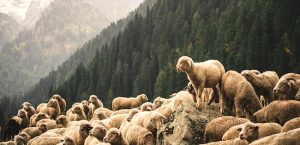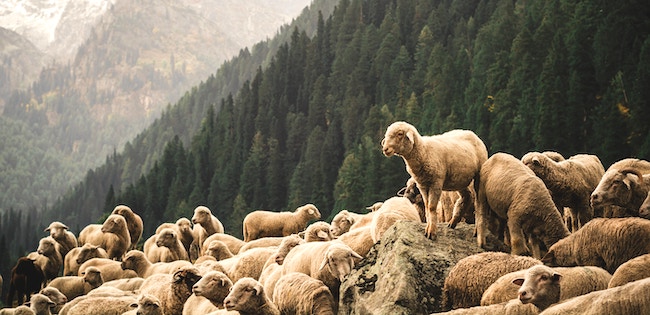
Sheep. You wouldn’t think they’d play a major role in determining our leaders, but they did. The Midrash says that one of Moshe’s defining acts that moved G-d to choose him as the leader of Israel was his attitude toward his animal flock. Once a ewe wandered from the pack, and Moshe scoured the desert to find it. He finally found the parched and exhausted creature, and he fed and carried her back to the rest of the flock. G-d was impressed. On the way home, Moshe saw a very fascinating sight. A burning bush. The rest is history.
King David was also a shepherd. The Midrash tells us that David’s handling of sheep was also the impetus for G-d to choose him to lead His flock. David had a very calculated grazing system. First he would allow only the young sheep to pasture. They would eat the most tender grass. After they finished, David allowed the older sheep to graze. In this manner the tougher meadow grass was left for those sheep with stronger jaws. The Midrash tells us that G-d was impressed with David’s abilities to discern the different needs of varying age groups and foresaw in those actions the leadership qualities needed to be King of Israel.
So much for the careers of two of our greatest Jewish leaders as shepherds. What troubles me is this week’s Torah portion which contains a long episode that also deals with sheep. It expounds in detail exactly how Yaakov manipulated genetics and had the acumen to cultivate an amazingly large and diverse flock. However, I am troubled. Why is a long narrative of seemingly inconsequential breeding techniques detailed so intricately? The Torah spends nearly twenty verses on a half-dozen varieties of sheep colors and explains how Yaakov bred them. Why are such seemingly insignificant breeding details given so much play in the Torah? Let us analyze the story:
Yaakov worked fifteen years for his father-in-law, Lavan. No matter how arduously he toiled, Lavan constantly tried to deny Yaakov compensation. Finally, he forced Yaakov to accept a share in the sheep as wages, but only with certain stipulations. He would only compensate him with sheep that were an mutation from the normal flock. First, he set Yaakov’s wages to be paid with only speckled lambs that born of Yaakov’s flock. Yaakov, in a procedure that would have astounded even Gregor Mendel, produced sheep exactly according to those specifications. Next, Lavan allowed him striped sheep. Again, miraculously Yaakov cultivated his flock to produce a bounty of striped sheep! The Torah repeats the episode in various colors and stripes. What could be the significance of its importance?
Rabbi Aryeh Levin was once standing outside his yeshiva in Jerusalem while the children were on a 15 minute recess break. His son, Chaim, a teacher in the yeshiva, was standing and observing, when suddenly his father tuned to him. “What do you see my son?” asked Rav Aryeh. “Why,” he answered, “children playing!”
“Tell me about them,” said Reb Aryeh. “Well,” answered Reb Chaim, “Dovid is standing near the door of the school, with his hands in his pockets, he probably is no athlete. Moishie is playing wildly, he probably is undisciplined. Yankel is analyzing how the clouds are drifting. I guess he was not counted in the game. But all in all they are just a bunch of children playing.” Reb Aryeh turned to him and exclaimed, “No, my son. You don’t know how to watch the children.
“Dovid is near the door with his hands in his pockets because he has no sweater. His parents can’t afford winter clothes for him. Moishie is wild because his Rebbe scolded him and he is frustrated. And Yankel is moping because his mother is ill and he bears the responsibility to help with the entire household.
“In order to be a Rebbe you must know each boy’s needs and make sure to give him the proper attention to fulfill those needs.”
Yaakov had a very difficult task. His mission was to breed twelve tribes — each to be directed in a unique path. Some sons were to be merchants, others scholars. Judah was destined for royalty, while Levi was suited to be a teacher of the common folk. Each son, like each Jew, had a special mission. Hashem needed a father for the twelve tribes who would not breed all his children in the same mold. If Moshe’s and David’s destinies were determined by their care and compassion for their animal flock, perhaps Yaakov’s development of twelve tribes was pre-determined by his development of a wide array of his flock. Only someone who knew how to cultivate unity in diversity would know how to produce the forebearers of the Jewish nation.
Dedicated by Mr. And Mrs. Joel Mandel
Drasha is the internet edition of
Fax-Homily — a project of the Henry & Myrtle Hirsch Foundation
Yeshiva of South Shore – 516-328-2490 – Fax : 516-328-2553
Text Copyright © 1996 Rabbi M. Kamenetzky and Project Genesis, Inc.
The author is the Dean of the Yeshiva of South Shore.


